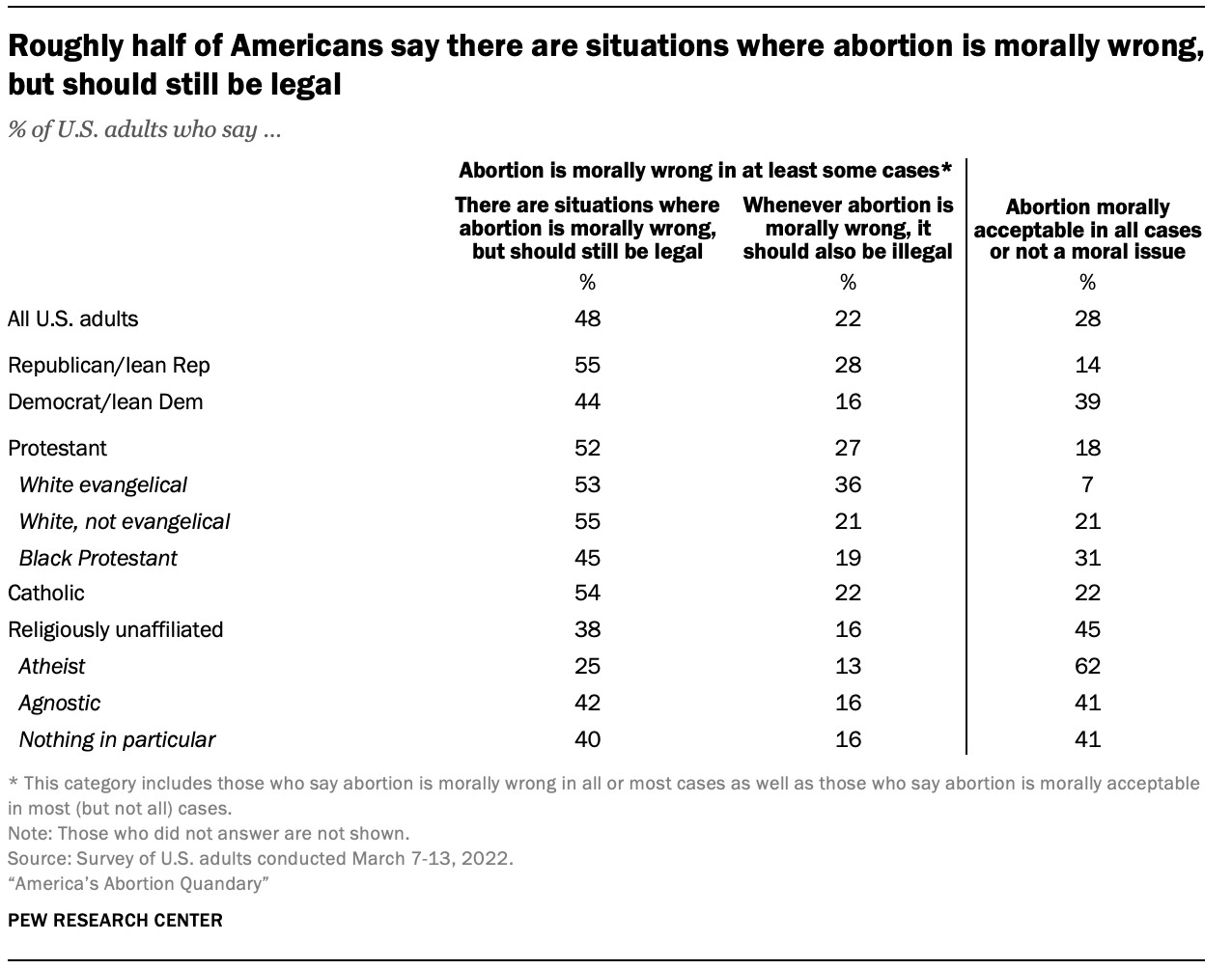Abortion remains one of the most intensely debated topics in contemporary society, sparking passionate discussions across ethical, moral, and personal dimensions. While public opinion surveys, like those conducted by the Pew Research Center, reveal a spectrum of views on the morality of abortion, a significant portion of the population believes abortion is morally wrong in most or all circumstances. This article delves into the core arguments explaining Why Abortion Is Wrong, aiming to provide a comprehensive understanding of the ethical considerations at the heart of this complex issue.
The Foundational Belief: The Sanctity of Human Life
At the forefront of the argument against abortion is the principle of the sanctity of human life. This viewpoint posits that human life is inherently valuable and deserving of protection from its very beginning. For many who oppose abortion, this beginning is marked at conception. From this perspective, a fertilized egg, embryo, or fetus is not merely biological tissue, but a unique human being with the potential for life, deserving of the same moral consideration as any born individual.
This belief resonates with a substantial segment of the population. As the original article points out, nearly four-in-ten Americans endorse the notion that “human life begins at conception, so a fetus is a person with rights.” This conviction forms a bedrock for the pro-life stance, arguing that terminating a pregnancy is not just a medical procedure, but the ending of a human life.
The Moral Status of the Fetus: Personhood and Rights
The debate over abortion fundamentally hinges on the moral status of the fetus. Those who argue against abortion often contend that the fetus, at various stages of development, possesses the characteristics of personhood, thereby entitling it to the right to life. This raises critical questions: When does a fetus become a person? What criteria define personhood?
Different viewpoints exist regarding fetal development and the acquisition of personhood. Some argue that personhood begins at conception, coinciding with the unique genetic identity formed at fertilization. Others point to milestones like the development of a heartbeat, brain activity, or viability (the ability to survive outside the womb) as markers of personhood. Regardless of the specific point, the underlying principle is that as a developing human being, the fetus gains increasing moral significance and rights, culminating in the right to life.
Opponents of abortion argue that denying personhood to the fetus based solely on its stage of development is discriminatory. They draw parallels to historical injustices where certain groups were denied rights based on arbitrary characteristics. Just as denying rights based on race or gender is now considered morally reprehensible, they argue that denying the right to life based on being unborn is equally unjust.
The Ethical Implications: Taking a Human Life
If one accepts the premise that a fetus is a human being with the right to life, then abortion becomes a morally problematic act. From this perspective, abortion is not simply the termination of a pregnancy, but the taking of a human life. This is a grave ethical consideration, as intentionally ending a human life is generally considered morally wrong, except in extremely limited circumstances like self-defense.
The ethical weight of this argument is significant. It challenges the notion that a woman’s right to choose unilaterally overrides the fetus’s right to life. Proponents of this view emphasize the inherent value of each human life and the moral obligation to protect the most vulnerable members of society, including the unborn.
Societal Consequences: Devaluation of Life
Beyond the immediate moral implications for the fetus, arguments against abortion often extend to broader societal consequences. Some argue that widespread abortion can lead to a devaluation of human life in general. If society becomes accustomed to the idea that fetal life can be easily terminated, it may erode the respect for life at other stages and in other contexts.
This concern is rooted in the idea that societal norms and values are shaped by our practices and laws. If abortion is widely accepted and practiced, it could normalize the idea that human life is contingent or disposable under certain circumstances. Critics argue this could have a corrosive effect on society’s moral fabric, potentially leading to a diminished respect for the vulnerable and a weakening of the social commitment to protect all human life.
Alternatives to Abortion: Promoting Life-Affirming Choices
Arguments against abortion are often coupled with a focus on promoting alternatives that support both women and unborn children. These alternatives emphasize life-affirming choices, such as adoption and comprehensive support for pregnant women and new mothers.
As the original article highlights, a significant majority of Americans believe that “more support for women during pregnancy, such as financial assistance or employment protections” would reduce the number of abortions in the U.S. This suggests a widespread recognition that addressing the underlying reasons why women seek abortion is crucial.
Proponents of the pro-life view advocate for increased resources and support for crisis pregnancy centers, adoption agencies, and social programs that assist pregnant women and new parents. They argue that by providing practical, emotional, and financial assistance, society can empower women to choose life for their children, even in challenging circumstances.
 A chart showing roughly half of Americans say there are situations where abortion is morally wrong, but should still be legal
A chart showing roughly half of Americans say there are situations where abortion is morally wrong, but should still be legal
Addressing Complex Scenarios and Hard Cases
It is important to acknowledge that the issue of abortion is not always clear-cut. There are complex and tragic situations, such as pregnancies resulting from rape or incest, or when the mother’s life is in danger. These “hard cases” often raise difficult ethical dilemmas for those who oppose abortion.
While the fundamental principle of the sanctity of life remains central, some who oppose abortion may acknowledge that in extremely rare and tragic circumstances, exceptions may need to be considered. However, even in these cases, the moral gravity of abortion is not diminished. The focus remains on finding solutions that minimize harm and uphold the value of all human life to the greatest extent possible.
Conclusion: A Call to Moral Reflection
The question of why abortion is wrong is deeply rooted in fundamental beliefs about human life, personhood, and moral responsibility. For those who hold a pro-life view, abortion is not simply a matter of reproductive rights, but a profound ethical issue concerning the taking of an innocent human life.
Understanding the arguments against abortion requires engaging with these core ethical considerations. While the debate surrounding abortion is likely to continue, a thorough examination of the moral and ethical arguments provides a crucial foundation for informed and thoughtful dialogue. It calls for a societal reflection on the value of human life, the responsibility to protect the vulnerable, and the importance of creating a culture that supports both women and children.
[
